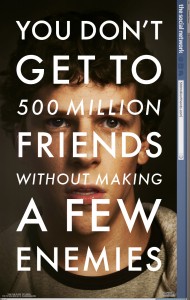Carrie Miller gets away from her computer to go to the movies to see The Social Network…
Have you noticed that it’s not just people who sell ‘handmade’ soap at markets complaining that our culture has become too high-tech, too overloaded with meaningless information, too much about voyeurism and instant gratification, too lacking in real human connection? The educated middle class particularly seem to have bought into the notion that life was so much simpler and people so much nicer before the advent of the mass media. No road rage, no mass shootings in high schools, families sitting around the dinner table discussing literature (Of course, back then a popular family outing included a trip to a public hanging in the town square). Lately, there’s been widespread moral anxiety about social media and they way it disconnects people from the ‘real’ world of ‘authentic’ existence.
If someone with a column in the Australian magazine was making a film about Facebook, this is the angle I’d expect them to take. So imagine my disappointment when my boyfriend and I spent last Sunday arvo in an artificially cooled Greater Union at a suburban Westfield hyped-up at the prospect of seeing the new David Fincher film about the social networking site.
The Social Network is a perfectly entertaining movie because the story is an inherently interesting one: how the biggest thing in digital media for a generation came about. But I was watching it against the background of some pretty glowing reviews – The Movie Show’s David Stratton gave it 5 stars – which praised the complex moral universe the film articulated through the very three-dimensional characterisation of the main players.
Ah, no. There’s nothing particularly complex about the characters or their relationships to each other. But I don’t have a problem with the fact that the main protagonists and their interactions are archetypal. It’s a fair bet that such a story would be populated with ready-made ‘types’ as people who achieve big things in life are often archetypal in character, and not just in retrospect. And that’s why, unlike some critics, I also don’t have a problem with the way women are portrayed as stereotypes in this film. Chicks are pretty much incidental to the plot. Most are just dumb, sycophantic sluts. I have no doubt these type of women inhabit the universe of digital entrepreneurs and perform their pre-determined roles perfectly. And I bet I’d find them as two-dimensional and annoying as they appear in Fincher’s film.
In fact, the one female character who really does prevent me from being convinced by this movie is the one who functions as the moral centre of the film. And unlike the other characters who seem believable as representations of their real-life counterparts, she has the feel of a director’s dramatic device and therefore a part of his own moral narrative (or perhaps the scriptwriter’s).
She’s the main protagonist Mark Zuckerberg’s ex-girlfriend (the opening break-up scene between them clearly aspires to not only neatly establish the moral distinction between ethical and unethical modes of being, it’s also an obvious nod to the inspired beginning of Todd Solandz’s Happiness).
The reason why the ex-girlfriend is, in the end, more annoying than the ditsy hangers-on is precisely that she’s employed to represent an ‘authentic’ human being. If you’re wondering what that is, the film suggests it’s someone who prioritizes ‘real’ relationships with ‘real’ people as against a socially retarded, amoral narcissist who creates an ‘inauthentic’ online version of reality but who fails to sustain meaningful human connections in his own life.
In the end, this aspect of the film, which to be fair is a sub-plot and so doesn’t completely overwhelm the more entertaining aspects of the movie, nevertheless is like the inner voice of your nagging mother: “Clean up your room”; “Get off the phone”; “Don’t have relationships mediated by machines”. And it quietly nagged at me until the final scene when unfortunately Fincher decides to hit the audience over the head like a bible basher with this moral truth (although, admittedly, not without a touch of irony).
As soon as I left the air-conditioned comfort of the cineplex I pulled out my Blackberry and shared my opinions about the movie with my Facebook friends while simultaneously debating the relative merits of it with my mate.


Ah yes, the real and the real…
Pingback: Tweets that mention The Social Network | The Art Life -- Topsy.com
I totally agree. I like how Zuckerberg sends a friend request to the ex-girlfriend, effectively “adding” not renewed friendship but an authentic moral centre to his otherwise supposedly decentred, defragmented existence. The film was, to quote it, like “dating a stairmaster”.